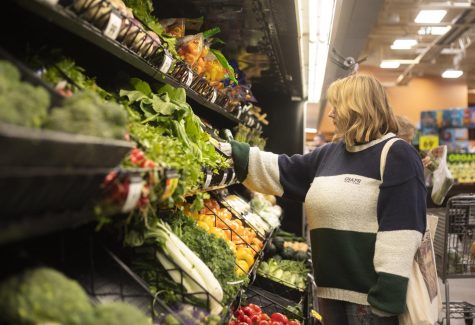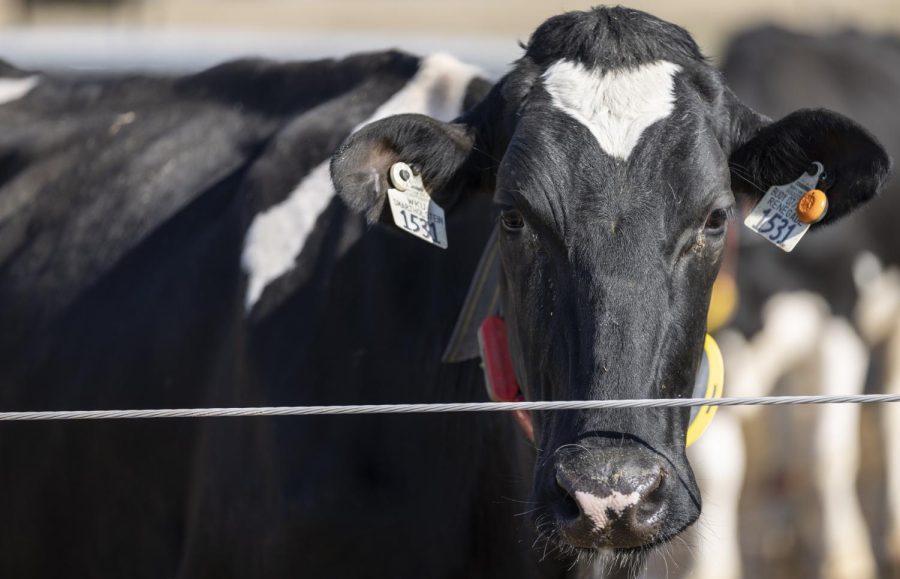WKU community preserves environment through food sustainability
A cow at the WKU Agriculture & Research Education Center in Bowling Green, Ky. on Saturday, Jan. 21, 2023.
February 14, 2023
Every year, over one-third of all food purchased in America is wasted.
It is estimated that 103 million tons of wasted food were generated in 2018, according to the Environmental Protection Agency. Colleges and universities were responsible for 613,106 tons.
Members of the WKU and Bowling Green community are working to not only prevent food waste on campus, but to mitigate the effects wasted food has on the environment.
In doing so, the community has provided food for those in need and created scholarship opportunities.
In an attempt to rescue food from landfills, the WKU Food Recovery Network (FRN) chapter collects around 800 hundred pounds of food each semester from campus locations, Gabrielle Hanson, WKU Food Recovery Network president and agriculture major, said.
Students in the chapter pick up excess food from campus dining locations P.O.D Market, Pit Stop, Einstein Bros. Bagels, Subway and DaVinci’s, and they redistribute the food to nonprofits in Bowling Green, Hanson said.
The group mostly accepts single packaged foods that have expirations dates and are less likely to be contaminated.
The recovered food goes to nonprofits such as First Christian Church, Hope House Ministries, Barren River Area Safe Space and the WKU Food Pantry.
This semester the FRN recovered and donated around 770 pounds of food, Hanson said.
“I feel like food waste is a really weird problem we have,” Hanson said. “In my classes, we always talk about how we need to grow more food, but then you turn around and they are wasting hundreds of pounds of food.”
Hanson is proud of the work the FRN contributes to food recovery and is hoping to recruit more students to the chapter.
Students interested in the program can learn more on the instagram page @wkufoodrecovery or by contacting [email protected]
Julie Boca, First Christian Church Community Grocery volunteer, works with the FRN to distribute recovered food to the community.
The First Christian Church Community Grocery allows people who need assistance to come “shop” their abundant supplies of fresh produce, meat, portable foods, prepared food, canned foods, hygiene products and more.
Boca said that while the church does supply some food out of pocket or through grants, at least half of the food is recovered from other places.
Volunteers at the grocery help shoppers find the food they need while allowing them to have autonomy in picking out food.
“We didn’t want to just hand them a bag of food,” Boca said. “We wanted to give them choices and provide them with more dignity.”
Boca said she is grateful for the donations that allow the church to help those in need.
The pre-prepared food the FRN donates to the church is extremely helpful because it allows shoppers to have access to meals immediately, Boca said.
“It only takes one catastrophe, job loss or health situation, to suddenly need help getting food,” Boca said. “We try to make it a place where people feel welcome and not looked down upon.”
Another program the church grocery receives food from is Glean Kentucky, an organization founded in 2010 to address the problems of food waste and hunger.
Glean Kentucky donates fresh local produce three times a week to the church grocery.
“Last week we got over 500 pounds of produce,” Boca said. “It comes from Kroger, Sams and Meijers. This is all really new, but I am so glad to see it.”
The church is currently serving an average of 540 people per month, Boca said.
Apart from recovering food, an effective way to eat sustainably is by consuming less meat.
Anna Whaley, a sophomore international affairs and public relations major, has been a vegetarian her whole life.

Being vegetarian has not only been beneficial concerning health, but it has prevented Whaley from feeling guilty about the actions of the meat industry.
Due to the limitations of cooking in a dorm, Whaley is accustomed to shopping at Pod and Pit Stop for easy to make meals.
“At Pod or at Pit Stop, there are so many frozen food options, but they don’t really have any vegetarian frozen food options,” Whaley said. “I also wish they had more fresh fruits and veggies. I understand it can be hard to store those things, but I feel like it would be really good for all the vegetarian and vegan students on campus.”
According to Whaley, being vegetarian allows people to minimize their waste because excess food can be composted.
Whaley encourages people to try vegetarianism not just for the health benefits, but for ethical reasons and to limit the impact meat has on climate change.
While not all food can be utilized for consumption, composting is a great way to get rid of wasted food.
According to the United States Environmental Protection Agency, when food goes to landfills, the nutrients never go to the soil. Instead, the food rots and produces methane gas which contributes to global warming.
Rather than letting food from campus end up in landfills, Joseph Reynolds, Agriculture Technician, turns food scraps into compost at the WKU farm.
According to Reynolds, food waste is collected from campus dining locations such as DSU and the Commons, and it is then delivered to the farm.
The food scraps are first mixed with sawdust and later mixed with leaves to create compost, Reynolds said.
According to Reynolds, composting is the best way to get rid of food waste because it prevents the creation of methane and it allows people to grow plants more effectively while using less resources.
“Instead of going to a landfill and taking up space there, by putting it into compost you get benefits,” Reynolds said.
One benefit of creating compost is that it allows soil to hold water better, Reynolds said. It also helps loosen up soil so that plants can more easily absorb nutrients.
The finished compost is sold to the community, and the proceeds go towards funding scholarships for students in the Agriculture Department, Reynolds said. 75% of the proceeds go toward scholarships and 25% goes back to the city.
According to the WKU website, composting is one of the ways WKU is building a sustainable community and taking responsibility for the waste it produces.
“It’s a good program, and they have been doing it since the late 1980’s,” Reynolds said. “It doesn’t always amount to a lot, but it adds up.”
News reporter Madison Carter can be reached at [email protected].












![Students cheer for Senator at Large Jaden Marshall after being announced as the Intercultural Student Engagement Center Senator for the 24th Senate on Wednesday, April 17 in the Senate Chamber in DSU. Ive done everything in my power, Ive said it 100 times, to be for the students, Marshall said. So, not only to win, but to hear that reaction for me by the other students is just something that shows people actually care about me [and] really support me.](https://wkuherald.com/wp-content/uploads/2024/04/jadenmarshall-1200x844.jpg)




![Students cheer for Senator at Large Jaden Marshall after being announced as the Intercultural Student Engagement Center Senator for the 24th Senate on Wednesday, April 17 in the Senate Chamber in DSU. Ive done everything in my power, Ive said it 100 times, to be for the students, Marshall said. So, not only to win, but to hear that reaction for me by the other students is just something that shows people actually care about me [and] really support me.](https://wkuherald.com/wp-content/uploads/2024/04/jadenmarshall-600x422.jpg)








